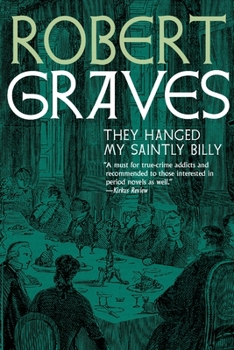They Hanged My Saintly Billy
Select Format
Select Condition 
Book Overview
A real historical figure, the British surgeon Dr. William Palmer was accused in 1856 of murdering fourteen people by means of poison. The Dr. Kevorkian trial of the 19th century, with a bit of O.J. Simpson mixed in for good measure, the scandal entranced nearly the entire population of the British Isles. Everyone had an opinion on the case--including esteemed poet and historical fabulist Robert Graves. They Hanged My Saintly Billy is true crime as only a true literary master could write it, with exquisitely rendered portraits of Palmer's era and milieu, told from the shifting perspectives of all who came into contact with the notorious doctor. Just as his renowned I, Claudius opened a window onto a case of history once thought to be closed, Graves's account of Palmer's life recasts the surgeon as a victim of yellow journalism and overzealous judges. But ultimately it's left up to the reader to decide whether or not Palmer's mother is in the right, or merely duped along with the rest of Palmer's supporters, when she laments: "Yes, they hanged my saintly Billy He was a bit of a scamp right enough, but a good son to me; the best of the brood . . . and no murderer."
Seven Stories' Robert Graves Project spans 14 titles, and includes fiction and nonfiction, adult, young adult and children's books, in a striking new uniform design, with new introductions and afterwords. They Hanged My Saintly Billy joins our recent re-publication of The Reader Over Your Shoulder, Ann at Highwood Hall, The Golden Fleece, and Homer's Daughter. Among the works still to come are Count Belisarius, Hebrew Myths, and Lawrence and the Arabs. The online partner for the Robert Graves Project is RosettaBooks
Seven Stories' Robert Graves Project spans 14 titles, and includes fiction and nonfiction, adult, young adult and children's books, in a striking new uniform design, with new introductions and afterwords. They Hanged My Saintly Billy joins our recent re-publication of The Reader Over Your Shoulder, Ann at Highwood Hall, The Golden Fleece, and Homer's Daughter. Among the works still to come are Count Belisarius, Hebrew Myths, and Lawrence and the Arabs. The online partner for the Robert Graves Project is RosettaBooks
Format:Paperback
Language:English
ISBN:1609807642
ISBN13:9781609807641
Release Date:October 2019
Publisher:Seven Stories Press
Length:368 Pages
Weight:0.85 lbs.
Dimensions:1.0" x 5.3" x 8.2"
Customer Reviews
1 rating
Murderer?
Published by Thriftbooks.com User , 24 years ago
The story of William Palmer is at once comic and tragic, for it is the story of a seemingly good man - a country doctor in nineteenth century England - who also just happens to be a forger, philanderer, fixer of horse races and common thief. But the law did not ultimately punish Dr. Palmer for any of these crimes; he is instead condemned by history as one of England's most notorious serial killers, a poisoner suspected in the deaths of his mother-in-law, wife, brother, children and his best friend. I recognized this tale from an adaptation on the PBS series MYSTERY from a few years ago; Palmer was portrayed as a cold-blooded sociopath who used his knowledge of science to serve his own narcissistic ends. So let us then thank Robert Graves for presenting the other side of the story, one supported by the facts and in the same mold as his other great historical fictions "I, Claudius" and "Claudius the God - Graves purports to show what really happened in that small village of Rugeley and the miscarriage of justice that occured at Palmer's trial. The author suggests that Dr. Palmer's most egregious fault was to run afoul of the "combined might of the Police, the insurance companies and the Jockey Club" - especially the latter, whom Graves smirks "would feel a hundred times less aggrieved with a man who garotted a fellow-criminal, an unwanted child, or an ailing relative, than with one who poisoned race-horses." There is little doubt that Palmer stole from friends and family alike or that he attempted to profit from the life insurance policies of those not long for this world; one of the book's most hilarious scenes has Palmer convincing his drunkard brother Walter to insure the remainer of his miserable life: "What about selling your life, Watty? You know it can't be a long one, not above ten years at the rate you're going . . . If you last beyond eight years, I'll be the loser, yet I don't mind taking the risk, if you promise to play fair. What do you say, Watty, old chum? It's easy money, like pledging your skeleton to a hospital." The genius of Graves is that he is able to contrast these moments of high comedy against the overwhelming conclusion that Palmer died a man innocent of the charges against him, namely, the murder of his friend John Parsons Cook. Justice was only a tool here, not the result, it was used to condemn a crook for his notorious life - Palmer was to become an example to all cheaters and deadbeats. I recommend this story to the reader who is able to draw his own conclusions about history - and one who enjoys a good laugh along the way.






